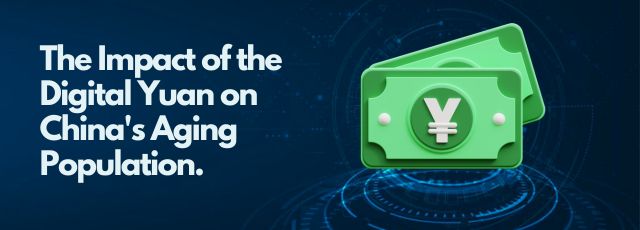According to the United Nations, China is home to the largest population of seniors in the world, with more than 250 million people aged 60 or older. This demographic shift has significant implications for China’s social and economic stability.
The purpose of this article is to explore the potential benefits of the digital yuan for China’s aging population, as well as the challenges that need to be addressed for its successful adoption. Moreover, trading digital yuan can be beneficial and make the most of it by using automated trading platforms.
Try using a reputable trading software as it is the best option for new and seasoned traders.
➤ The Digital Yuan and its Potential Benefits for China’s Aging Population
The digital yuan has the potential to offer many benefits to China’s aging population. One of the most significant benefits is that it can make transactions easier and more convenient for the elderly, who may have difficulty traveling to physical bank branches or handling cash. With the digital yuan, seniors can conduct transactions from the comfort of their homes using a smartphone or other digital device.
Another potential benefit of the digital yuan is that it can offer greater financial security to the elderly. Scams and financial fraud targeting seniors are a growing problem in China, and the digital yuan can offer greater protection against these types of crimes. Transactions made using the digital yuan are more secure than traditional cash transactions, and the digital yuan can also offer greater transparency and accountability in financial transactions.
In addition to these benefits, the digital yuan can also offer greater financial inclusion to China’s elderly population. Many seniors in China live in rural areas with limited access to traditional banking services. The digital yuan can help bridge this gap by offering a more accessible and user-friendly digital payment system.
Finally, the digital yuan can also offer greater access to government benefits for the elderly. In China, many government benefits are distributed through physical bank branches or other bureaucratic channels, which can be difficult for the elderly to navigate. With the digital yuan, these benefits can be distributed more efficiently and with greater transparency, ensuring that China’s elderly population receives the support they need.
➤ Challenges to the Adoption of the Digital Yuan Among China’s Elderly Population
Despite the potential benefits of the digital yuan, there are several challenges to its adoption among China’s elderly population. One of the most significant challenges is the digital divide. Many elderly people in China may not have access to the technology or digital devices needed to use the digital yuan. This can include smartphones or computers, or even basic digital literacy skills needed to navigate digital payment systems.
Another challenge is the lack of trust in digital payment systems among the elderly. Many seniors in China have grown up using cash and are wary of digital payment systems. They may be concerned about the security of their personal information or the reliability of the technology. Building trust in the digital yuan among this population will be key to its adoption.
Language barriers can also pose a challenge to the adoption of the digital yuan among China’s elderly population. Many seniors in rural areas may speak local dialects instead of Mandarin, which is the official language of China. This can make it difficult for them to understand and use the digital payment system, which may be presented in Mandarin only.
Lastly, there are concerns about the accessibility of the digital yuan for seniors with physical or cognitive disabilities. Some seniors may have difficulty using digital devices or navigating complex payment systems, and may require additional support or accommodations to use the digital yuan.
To address these challenges, efforts will need to be made to bridge the digital divide and promote digital literacy among China’s elderly population. Education and training programs can help seniors learn how to use digital payment systems and build trust in the technology. Language support and accessibility features can also be built into the digital yuan to ensure that it is accessible to all seniors, regardless of their language or abilities.
Overall, while there are challenges to the adoption of the digital yuan among China’s elderly population, these challenges can be addressed through targeted efforts and support. By overcoming these challenges, the digital yuan has the potential to bring many benefits to China’s aging population.
Conclusion
In conclusion, the digital yuan has the potential to offer many benefits to China’s aging population, including greater convenience, financial security, inclusion, and access to government benefits. However, challenges to its adoption among China’s elderly population, such as the digital divide, lack of trust, language barriers, and accessibility issues, will need to be addressed to ensure its successful implementation.
